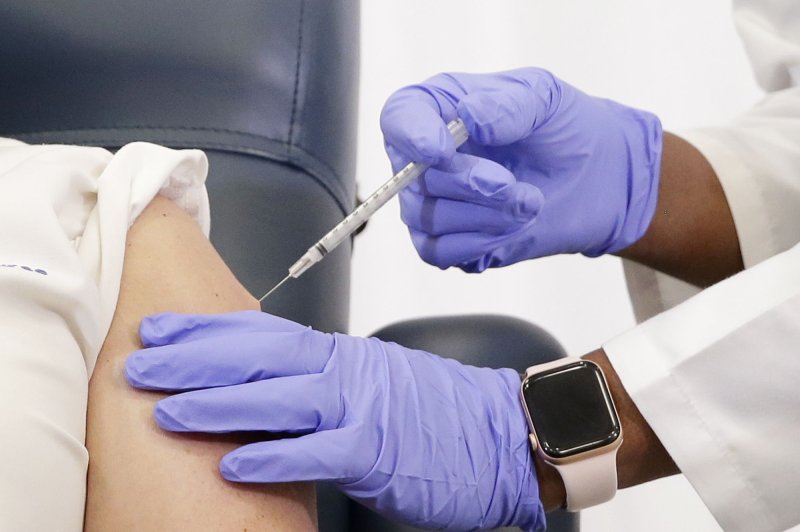1 of 2 | The Pfizer-BioNTech COVID-19 vaccine shot produces a lower, but still effective, immune protection from the virus in people with cancer, a new study has found. File Photo by John Angelillo/UPI |
License Photo
May 28 (UPI) -- The COVID-19 vaccine works for people receiving treatment for cancer, even with a lower immune response than those without the disease, a study published Friday by JAMA Oncology found.
Ninety percent of patients treated for cancer and given the two-dose Pfizer-BioNTech vaccine tested positive for antibodies against the coronavirus two weeks after their second shot, the data showed.
Though their levels of antibodies -- cells produced by the immune system to fight off viruses -- were about 70% lower than those of people without cancer, they were still high enough to provide protection against infection, the researchers said.
Cancer patients "should get vaccinated," study co-author Dr. Salomon M. Stemmer told UPI in an email.
After vaccination, their "antibody levels are way above the lower threshold" for protection, said Stemmer, a professor of oncology at Rabin Medical Center in Petah Tikva, Israel.
The two-dose vaccines from Pfizer-BioNTech and Moderna are more than 90% effective at preventing severe illness following coronavirus infection by stimulating the immune system to fight off the virus, according to earlier studies.
Up to 3 million adults in the United States, including cancer patients, take medications that suppress the immune system, and these drugs are believed to reduce the effectiveness of COVID-19 vaccines, research indicates.
Examples of medications that may interfere with the vaccines include steroids, such as prednisone, and immunosuppressants such as methotrexate, which are used to treat a variety of conditions, including rheumatoid arthritis, multiple sclerosis and psoriasis.
Chemotherapy drugs may also impact immune response to vaccines, according to Stemmer.
For this study, he and his colleagues compared the immune response to the Pfizer-BioNTech vaccine in 102 cancer patients with those of 78 people who did not have the disease.
Among the participants without cancer, 100% tested positive for antibodies against the coronavirus two weeks after receiving the vaccine, while 90% of those with the disease did so.
Cancer patients who produced antibodies following vaccination still had levels above the minimum threshold for protection against the virus, the researchers said.
However, given that they were lower than those of people without the disease, physicians should "continue to monitor the antibody levels [of cancer patients] based on time from the vaccination" to ensure they remain protected, Stemmer said.
Stemmer said he would expect cancer patients to have an immune response to Moderna's COVID-19 vaccine like what was seen in the trial with Pfizer-BioNTech's product because the two are similar, but these studies have not yet been conducted with cancer patients given the Moderna shot.
Homeless and migrant laborers affected by the COVID-19 lockdown queue up to receive free cooked food distributed by Sikh volunteers in New Delhi, India, on May 18, 2021. Photo by Abhishek/UPI |
License Photo
















